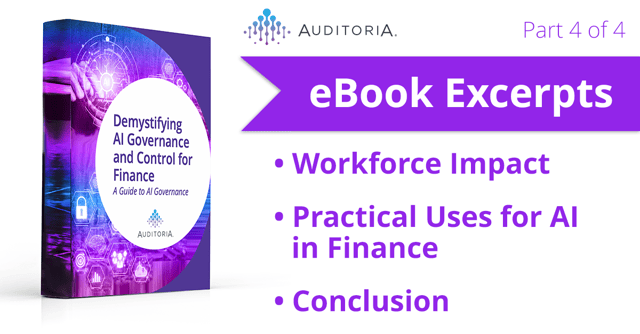
The final teaser of Auditoria’s latest eBook “Demystifying AI Governance and Control for Finance: A Guide to AI Governance.”
In Part 4 of 4 of our social and blog posts, we’ll discuss workforce impact, share some practical uses for AI in finance, and draw some conclusions about AI Governance in Finance.

Workforce Impact
The automation potential of generative AI may raise concerns about job displacement in the finance office. Organizations should proactively address these concerns by re-skilling and upskilling employees to work alongside generative AI systems, focusing on tasks that require human judgment, creativity, and critical thinking.
Ethical AI prioritizes the well-being and interests of humans. AI systems should be designed to enhance human lives, promote safety, and respect human autonomy. This means considering the potential social, economic, and psychological impacts of AI deployments and involving diverse stakeholders in the decision-making processes.
To get the most out of an AI-implementation, organizations should help their teams to:
- Augment and upskill employees
- Transition to data analytics and decision-making
- Transition to application and systems management
- Focus on tasks requiring human judgment

Practical Uses for AI in Finance
With the right governance, AI-enhanced technology is readily available and deployable and could make dramatic improvements for accounting workflows.
It may be only a few years before a young employee reacts with shock upon hearing the accounting close was once a monthly event — weren’t the books always up to date? And soon self-learning software agents will run many processes on their own. A forecasting system, for instance, could tell ERP to raise target inventory levels immediately when it spies a chance to capture market share. The use cases for AI in finance are many, and forward-thinking enterprises that want to remain leaders will be investing in AI-based projects to gain advantages and remain relevant.
Some areas in which AI will have an immense impact are the following:
Financial Planning and Analysis
- Forecasting / Scenario Planning
- Cash Performance Analysis
- Predicting Customer Behavior
General Ledger / Accounting
- Journal Entry Estimation
- Process Automation
- Trend / Anomaly Detection
- Risk Management
Accounts Receivable / Payable
- Collections and Billing
- Invoice Digitization
- Rapid Email Responses
- Communications Management

Conclusion
By demystifying AI, presenting frameworks for responsible governance, and exploring its practical applications in finance, organizations are better equipped with the knowledge and tools necessary to understand and harness AI’s potential responsibly and effectively. It underscores the importance of ethical considerations, fairness, privacy, and human oversight in AI systems.
Key Takeaways
Understand AI
- Debunk misconceptions
- Educate on good governance practices
- Choose or create the right AI governance framework
Ethics, Security, and Accountability
- Consider the key factors in assessing AI capabilities
- Explainability and Interpretability
- Fairness and Bias
- Privacy and Safeguards
- Data Security and Compliance
- Validation, Reliability, and Transparency
- Human Oversight and Intervention
AI Use Cases for Finance
- Process Automation
- Cash Performance Analysis
- Journal Entry Estimation
- Collections and Billing
- Communications Management
- Rapid Email Responses
Fill out the form and download your complimentary copy of the Auditoria.AI eBook.
"Demystifying AI Governance and Control for Finance - A Guide to AI Governance"
